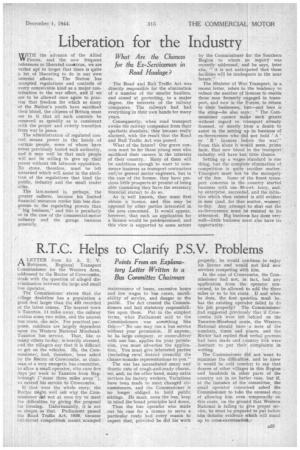Liberation for the Industry
Page 25

If you've noticed an error in this article please click here to report it so we can fix it.
What Are the Chances for the Ex-Serviceman in Road Haulage?
WITH the advance of the Allied Vir Forces, and the now frequent references to liberated couiltries, we are rather apt to forget that there is quite a lot of liberating to do in our own internal affairs. The Nation has accepted regulations and controls of every conceivable kind as a major contribution to the war effort, and if we are to be allowed once again to practise that freedom for which so many of the Nation's youth have sacrificed their blood, the citizens of Britain must see to it that all such controls be removed as speedily as is consistent with the proper and orderly transition from war to peace.
The administration of regulated control means power in the hands of certain people, some of whom have never previously tasted such authority, and it may well be that such people will not be willing to give up their power without tilt bitterest opposition. No stone, therefore, must be left unturned which will assist in the abolition of the regulations that bind the public, industry and the small trader The last-named is, perhaps, the greater sufferer, because his limited financial resources render him less dangerous to the regulating powers than " big business," and this is peculiarly so in the case of the commercial-motor industry and the garage business generally. The Road and Rail Traffic Act was directly responsible for the elimination of a number of the smaller hauliers, and aimed at protecting, to a major degree, the interests of the railway companies. The railways had had everything in their own hands for many years.
Consequently, when road transport awoke the railway companies from their apathetic slumbers, they became really alarmed, with the result that the Road and Rail Traffic Act was passed.
What of the future? Our grave concern must be for those young men who sacrificed their careers in the interests of their country. Many of them will be ambitious enough to want to commence business as transport contractors and/or general motor engineers, but in the case of the former, they have precious little prospects at-present of being able (assuming they have the necessary financial status) to do so.
As is well known, they must first obtain a licence, and this may be opposed by other parties interested in the area concerned. It would appear, however, that such an application for a licence would be predetermined, and this view is supported to some extent by the Commissioner for the Southern Region to whom an inquiry was recently addressed, and he says, inter alia, " it is not anticipated that these facilities will be inadequate in the near future."
The Minister of War Transport, in a recent letter, refers to the tendency io reduce the number of licences to enable those men formerly engaged in transport, and now in the Forces, to return to their businesses, but—and here is the sting—he also says: "The Commissioner cannot make such grants without regard to transport already licensed, or merely from a desire to assist in the setting up in business of ex-Servicemen who did not hold ' A ' or ' B ' licences before the war:" From this alone it would seem, prima facie, that new blood in the transport industry will have but little Chance.
Setting up a wages standard is one thing, but the complete elimination of competition is quite another matter. Transport must not be the monopoly of the few, Some of the finest transport concerns in the country started business with one 30-cwt. lorry, and, by enterprise, succeeded, and the initiative which then existed is still evident in men (and, for that matter, women) to-day. Any attempt to shut out the ex-Serviceman must be resisted to its uttermost. Big business has done very well—little business must also have its opportunity.




















































